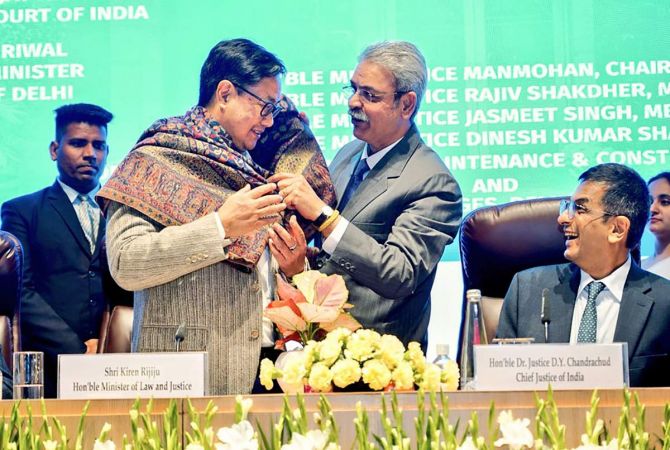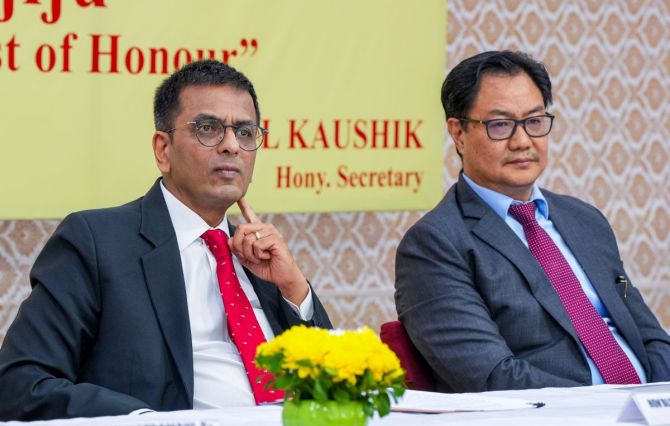'When two organs of our Constitution, which are supposed to be the strongest pillars of Indian democracy, start mistrusting each other, then what is left of the country? What is left of democracy?'

Retired Delhi high court judge Justice R S Sodhi, whose Twitter video saying that the judiciary has hijacked the Constitution was latched onto by Union Law Minister Kiren Rijiju to take on the judiciary, speaks to Prasanna D Zore/Rediff.com at length about what's wrong with the Supreme Court's Collegium system of appointing judges to the higher judiciary and why the government and the judiciary should act sensibly and Parliament should enact another legislation for appointment of judges in consonance with the judiciary.
The first of a two-part interview:
Your video on Twitter has you saying that the judiciary has hijacked the Constitution has found quite some support among ministers...
Firstly, I did not post anything. You people are posting them yourselves (on social media). I don't post them.
The Union law minister has supported your view about the judiciary hijacking the Constitution.
It is very nice of him.
Why would you feel that the judiciary has hijacked the Constitution?
The judiciary has hijacked the Constitution. They have hijacked the Constitution because the Constitution doesn't envisage a Collegium system (for appointing judges to the high courts and Supreme Court) at all. And they (the Supreme Court) have introduced the Collegium system by amending the Constitution.
How can they do that? They have no power. They can only interpret the Constitution; they cannot amend or make laws. But they have done it (in 2015, the apex court struck down the National Judicial Appointments Commission (NJAC) by a 4:1 majority, stating that it violated the basic structure of our Constitution) and therefore, they arrogated to themselves the power to appoint themselves.
So now there are self-appointed people who are running the judiciary of this country and holding the whole nation hostage.
Does our Constitution have checks to prevent what you allege is the 'hijacking of the Constitution' by the judiciary?
Parliament has to come into effect immediately; it must take remedial steps to ensure that the courts function within their respective environments (jurisdiction) and all the checks and balances are maintained.
And the Constitution functions as it is meant to function and not based on the whims and fancies of somebody.
In a Parliamentary democracy, Parliament is supreme. The Narendra Modi government has an absolute majority in both Houses of Parliament, yet, despite criticising the scrapping of the NJAC by the Supreme Court by senior members of the executive like the law minister and the vice president of India, the government has not moved forward, as suggested by you, to convene both Houses of Parliament and over-rule the scrapping of the NJAC by the Supreme Court or to enact a new law that lays down the procedure to appoint judges? Why?
I would not be the right person to answer that. I am not in government. I am an ordinary citizen like you are and I am asking the same question (as to why the Modi government is not convening a session of Parliament to over-rule the scrapping of NJAC).

Is this a good sign that the two organs of the Indian State -- the judiciary and executive -- are in a standoff with each other over how judges are appointed to the higher judiciary? Is this public standoff good for India's democracy?
Certainly not; when two organs of our Constitution, which are supposed to be the strongest pillars of Indian democracy, start mistrusting each other, then what is left of the country? What is left of democracy?
How can the court (the judiciary) say we don't trust the legislature; and how can the executive say they don't trust the courts. I mean, both of you are mudslinging at each other, and expect us, the people, to give one of you a verdict. Is that how our system will work?
So what's the way out of this impasse?
The only way is that both of them -- the judiciary and the executive -- should step down (from their public spats) and talk to each other.
Both of them have to step back a little, sit together and try to make a law (for appointment of judges to high courts and the Supreme Court) or an enactment which gives credibility to the judiciary as also to Parliament but keeping it within the framework of the Constitution.
You just cannot run this country and courts on your whims and fancies just because you have the power, one way or the other, misuse it and defile the spirit of the Constitution.










